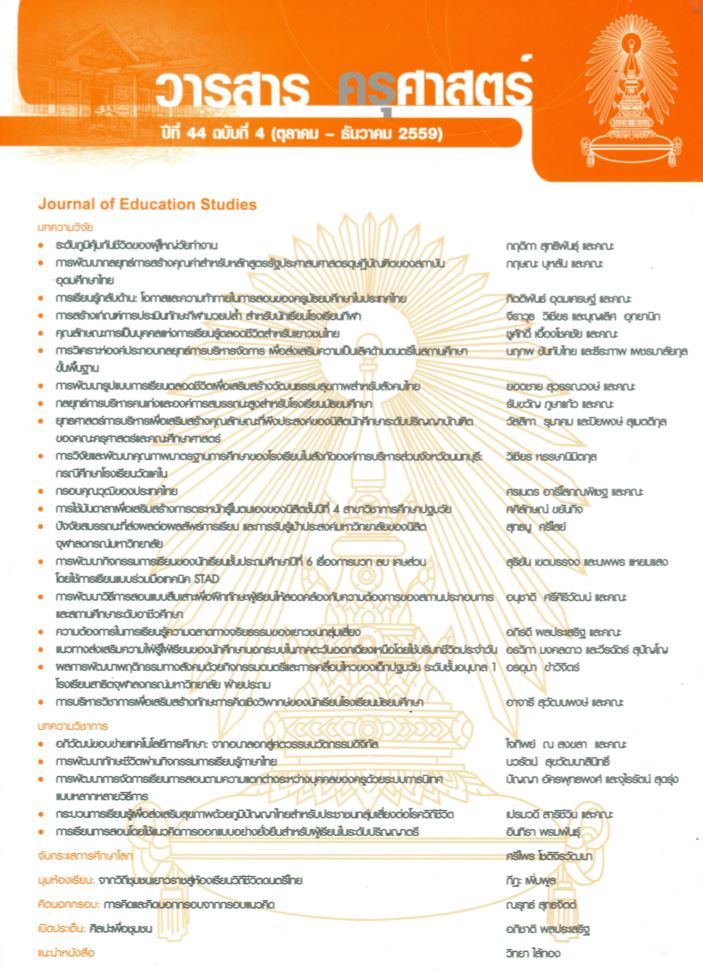การพัฒนาการจัดการเรียนการสอนตามความแตกต่างระหว่างบุคคลของครู ด้วยระบบการนิเทศแบบหลากหลายวิธีการ
Keywords:
การนิเทศแบบหลากหลายวิธีการ, การนิเทศการสอน, ความแตกต่างระหว่างบุคคล, DIFFERENTIATED SUPERVISION, INSTRUCTIONAL SUPERVISION, INDIVIDUAL DIFFERENCESAbstract
ในปัจจุบันการนิเทศการสอนเพื่อพัฒนาการจัดการเรียนการสอนในโรงเรียนจะใช้รูปแบบการนิเทศทางตรง เป็นส่วนใหญ่ ปัญหาที่เกิดขึ้นอย่างต่อเนื่อง คือ การขาดแคลนผู้นิเทศ การนิเทศไม่สอดคล้องกับความต้องการของครู ทำให้ครูไม่เปลี่ยนแปลงพฤติกรรมและไม่นำผลการนิเทศไปพัฒนาการสอนเท่าที่ควร ระบบการนิเทศแบบหลากหลายวิธีการ ซึ่งโรงเรียนในประเทศสหรัฐอเมริกานำมาใช้อย่างมากในการนิเทศการสอน น่าจะเป็นทางออกสำหรับปัญหาดังกล่าวได้ ในระบบการนิเทศนี้ ครูจะมีส่วนร่วมในการกำหนดรูปแบบการนิเทศของตนเอง ซึ่งประกอบด้วย 1) การนิเทศแบบคลินิก ซึ่งเป็นช่วยเหลือครูโดยตรงของผู้นิเทศ 2) การนิเทศแบบร่วมพัฒนาวิชาชีพ ซึ่งเป็นการช่วยเหลือกันเองในกลุ่มครู 3) การนิเทศแบบพึ่งตนเองซึ่งเป็นการช่วยเหลือตนเองของครู และ 4) การนิเทศโดยผู้บริหาร ซึ่งเป็นการตรวจเยี่ยมชั้นเรียนของผู้บริหาร โดยมุ่งหวังว่าการนิเทศในรูปแบบที่หลากหลายจะสามารถตอบสนองต่อความต้องการจำเป็นที่หลากหลายของครูได้ และทำให้ครูเกิดการพัฒนาการจัดการเรียนการสอนได้อย่างมีประสิทธิภาพตามศักยภาพของตน
Nowadays, instructional supervision for instructional development in school is mostly conducted through directive approach. However, there have been several problems such as the lack of supervisors, and the supervision not being responsive to teachers’ needs. Consequently, teachers neither change their behaviors nor use what they were supervised in to develop themselves effectively. The differentiated supervision system, which American schools widely used for instructional supervision, might be the solution to these problems. In this system, teachers cooperate with the school to determine which of the offered supervisory approaches they desire, including: 1) clinical supervision in which supervisors directly support teachers, 2) cooperative professional development in which teachers support one another as a group, 3) self-directed development in which teachers individually support their own self, and 4) administrative monitoring in which teachers’ classes are shortly visited. This is on the expectation that variety supervisory approaches will be able to respond to the variety of teachers’ individual needs, resulting in the efficient instruction development of an individual teacher to his/her potential




